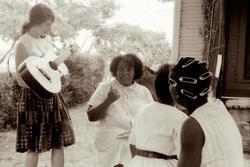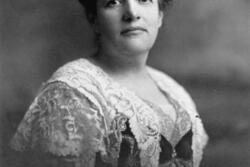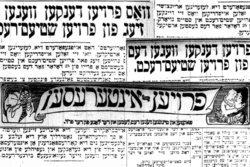Democracy is Not a Spectator Sport: Reflections on the Centennial of Women’s Suffrage
This essay is part of JWA’s 2020 Suffrage Series on the blog.
The first time I voted was in 1962—exactly 42 years after white women earned the right to vote. Since then, I have voted in every single election because, as the late John Lewis noted, “The vote is the most powerful non-violent tool we have.”
Long before I was able to cast my own vote, I remember going to the polls with my parents. Even as a child, I had a sense of both the privilege and the responsibility we are afforded in the United States to choose our political leaders.
Many American women of different generations and backgrounds have memories of their first time stepping into a voting booth or slipping a ballot into a mailbox. But fewer understand the revolutionary history of when, and how, women secured the right to vote—or the gravity of the work that remains to help women participate equitably in political processes.
I’ve always been frustrated by the simplified narrative about women’s suffrage in the United States. As the story goes, Susan B. Anthony and Elizabeth Cady Stanton—two white, Protestant, middle-class women—led the effort for women to win the right to vote, beginning at the Seneca Falls Convention in 1848 and ending with the ratification of the Nineteenth Amendment in 1920.
But women were fighting for political rights before the 1830s and during the movement to abolish slavery. The true pioneers of those efforts were African-American women—Harriet Forten Purvis, Mary-Ann Shadd Cary, and Frances Ellen Watkins Harper—along with immigrant Jewish women like Ernestine Rose. Rose is often forgotten as one of the early suffragists and abolitionists, but I believe she is one of the most important. She argued that ending slavery and achieving voting rights for women were interdependent efforts and needed to happen in tandem. “Emancipation from every kind of human bondage is my principle,” she asserted. Women on the margins, like Rose, were among the strongest advocates for linking these struggles—what we would refer to today as an intersectional approach to liberation, a concept developed in 1989 by scholar and civil rights advocate Kimberlé Crenshaw.
Today, it is easy for women who live with relative comfort and privilege to believe that the work of the early suffragists has fully taken root. It is equally easy to imagine a linear progression of voting rights that extends from women, to people of color, and to formerly incarcerated individuals; a progression that would, no doubt, strengthen our democracy.
But, unfortunately, many states have engineered massive suppression efforts to quash the voting rights of women, indigenous people, students, the elderly, people with disabilities, people in low-income neighborhoods, previously incarcerated people, and other disenfranchised groups. Voter suppression is enacted in different ways: enforcing voter ID laws (often arbitrarily), eliminating early voting, purging voter registration records, relocating polling stations (often without any notice), creating special hassles for students on campuses, developing essential poll tax requirements, and, of course, gerrymandering—the practice of redrawing district lines to limit the influence of voters and unfairly sway the outcome of an election.
Unfortunately, people who have historically done the hardest work to champion democracy are often the ones who get stripped of their voting rights—or who experience the injustice of our political system when they run for office themselves. Take Stacey Abrams, for example, an extraordinary Black leader who lost an election because of voter suppression and is now championing nationwide efforts to fight it.
As a former elected official in New York City, I know what it feels like to win and lose elections. And I cannot overstate the importance of voting. Yet when I campaign for candidates today, I often need to convince people of two core truths: The first is that voting actually does make a difference. Nothing demonstrates this more dramatically than last year’s Boston City Council election. Julia Mejia, an Afro-Latinx Dominican activist who came to New York to work on my mayoral campaign in 1997, ran a great campaign for Boston City Councilor At-Large. The race was so close that it required a recount, and she won by one vote. Just one!
The second truth I share is that there are no perfect candidates, which will surprise those who believe that perfect people exist. We do ourselves and our country a major disservice when we subject people to purity tests and then, out of disappointment, choose to sit an election out. We must exercise our voting responsibility—not simply our right—because democracy is not a spectator sport and because, in any contest, one candidate will always hew more closely than others in terms of positions, personality, and style for our desired leader.
Democracy is a team sport that requires each of its citizens to be engaged, and currently, we are playing poorly. I’m painfully reminded that in 2016, 92 million eligible American voters did not participate in the election. The number of non-voters was even higher in midterms, primaries, and local mayoral elections, where, in fifteen large US cities, voter participation dipped below 20 percent. We have lower turnout rates than countries all over the world that fought for the right to vote because they were so moved by how Americans had achieved voting rights in the United States.
If we want to change what our future looks like, everyone needs to participate. We need to pledge our own commitment to vote—in every single election. No amount of despair should prevent a person from escaping the political, ethical, or spiritual oblation to vote. We must break down the barriers to voting—and I’m counting on women to lead the way. It is especially important to encourage 18 to 25-year-olds to not “sit it out” this November, even if the candidate they voted for in the primary is not on the ballot—and even if they believe their vote is inconsequential. The 2020 election may be the most significant election in our lifetimes.
We have an opportunity to be history-makers through the act of voting, and by encouraging full and equitable participation in democracy. The women who fought for the right to vote mustered the courage to chart a better future. Now it’s our turn to do the same.








